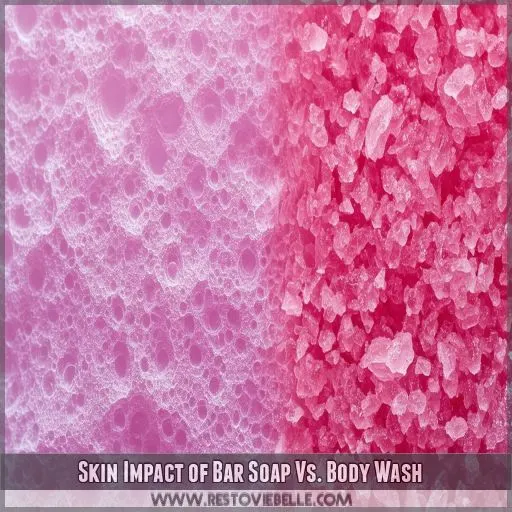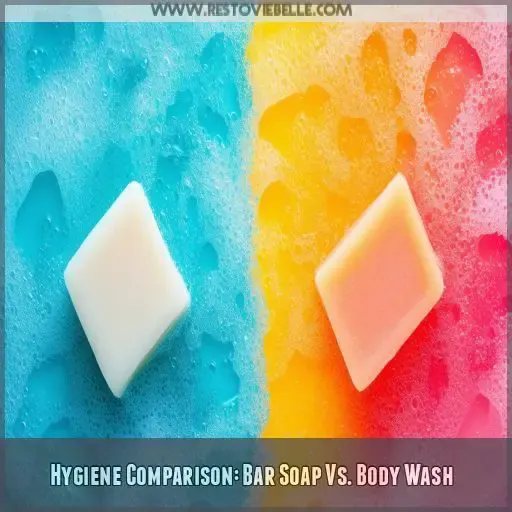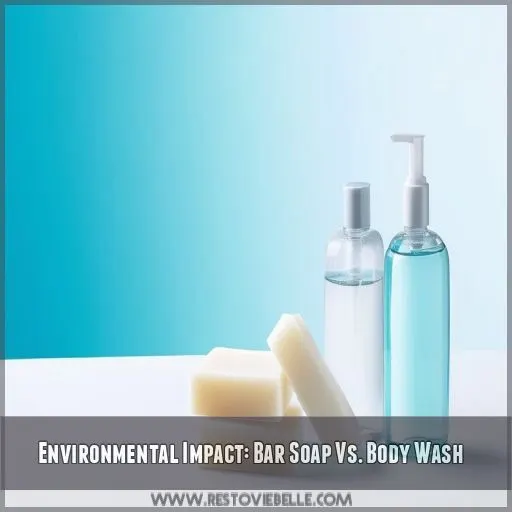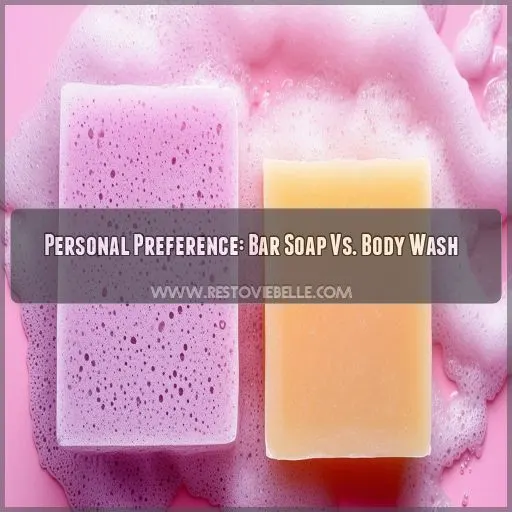This site is supported by our readers. We may earn a commission, at no cost to you, if you purchase through links.
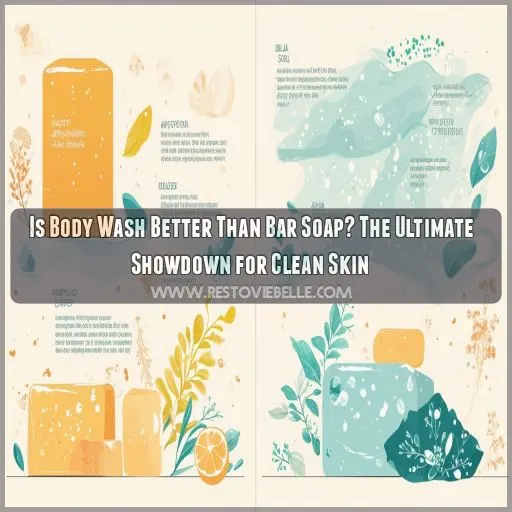
Now, in this ultimate showdown for clean skin, we’ll weigh in on the pros and cons of each. You will find out how they impact your skin’s health, hygiene, and the environment.
Knowing how these are different will help you make a decision that suits your skin’s needs and personal preferences.
Let us now dive into the world of cleansing options full of suds.
Table Of Contents
- Key Takeaways
- Is Body Wash Better Than Bar Soap?
- Skin Impact of Bar Soap Vs. Body Wash
- Hygiene Comparison: Bar Soap Vs. Body Wash
- Environmental Impact: Bar Soap Vs. Body Wash
- Personal Preference: Bar Soap Vs. Body Wash
- Allergen and Sensitivity Considerations
- Frequently Asked Questions (FAQs)
- Is it healthier to use bar soap or body wash?
- Which is better soap or body wash?
- Is it better to use a bar or bottle of body wash?
- Why do people use body wash instead of bar soap?
- How do bar soap and body wash affect shower drain clogs?
- Can bar soap or body wash be used as shampoo substitutes?
- Which option is more cost-effective over time: soap or wash?
- Do bar soaps and body washes have different expiration dates?
- How do travel regulations differ for bar soap versus body wash?
- Conclusion
Key Takeaways
- It’s not a clear-cut case of David vs. Goliath—both bar soap and body wash have their strengths and weaknesses. Your skin type is the real MVP here, calling the shots on which cleanser will be your shower buddy.
- Bar soap might be the unsung hero of eco-warriors, with its minimal packaging and often biodegradable ingredients. But don’t write off body wash just yet—some brands are stepping up their green game faster than you can say "plastic-free."
- If your skin’s as dry as a desert, body wash might be your oasis. It’s packed with hydrating goodies that’ll make your skin happier than a clam. But if you’re more of a "keep it simple" type, good ol’ bar soap might be your cup of tea.
- When it comes to hygiene, it’s not exactly a soap opera. While bar soap might get a bad rap for harboring bacteria, it’s not the germ festival some make it out to be. Body wash, on the other hand, is like a fortress against microbes—but hey, to each their own!
Is Body Wash Better Than Bar Soap?
When one asks which is better between body wash and bar soap, there is no uniform answer. Body wash hydrates and nourishes more, so it’s good for dry or sensitive skin. Besides, it is more hygienic due to its liquid form, allowing fewer bacteria to grow in it.
Not to mention the merits of bar soap options: less packaging waste and often more natural ingredients. Knowing your skin type, environmental concerns, and personal preference is essential in deciding which one is going to work better for you.
Where moisturizing is concerned, body wash may have a slight edge, but both can clean your skin just fine. It really comes down to what matters most to you and what your individual needs and priorities are.
Let’s dive deeper into the specifics of each option.
Skin Impact of Bar Soap Vs. Body Wash
You’ll notice a difference in how bar soap and body wash affect your skin’s moisture. While bar soap can strip away natural oils and leave your skin feeling dry, body wash often contains hydrating ingredients that help maintain your skin’s moisture balance.
Drying Effects of Bar Soap
You’ve probably noticed that bar soap can leave your skin feeling tight and dry. This is due to its higher pH levels, which disrupt your skin’s natural balance. While bar soap effectively cleanses, it strips away essential oils, potentially exacerbating specific skin conditions.
However, it’s not all bad news – some bar soaps offer exfoliation benefits and are travel-friendly. The aesthetic appeal of bar soap remains strong for many users.
Hydration Benefits of Body Wash
You’ll love how body wash pampers your skin with hydrating ingredients. Unlike bar soap, which can strip away natural oils, body wash is designed to moisturize as it cleanses.
Many formulas contain nourishing elements like shea butter, coconut oil, and other emollients that lock in moisture.
If you’re prone to dry skin, a gentle, moisturizing body wash can provide much-needed relief and leave your skin feeling soft and supple.
Hygiene Comparison: Bar Soap Vs. Body Wash
You might worry about bacteria on your bar soap, but studies show it’s unlikely to transfer harmful microbes to your skin. Body wash, stored in a bottle, can offer a more hygienic option if you’re concerned about shared soap or proper storage.
Bacterial Concerns With Bar Soap
You may have heard that bar soaps are germ magnets, but let’s clarify. While it’s theoretically correct that a used bar soap does harbor bacteria, the pathogenic exposure is almost negligible. Added cleanser ingredients such as sodium lauryl sulfate in the cleanser fight microbial contamination.
However, for sensitive skin, risks of cross-contamination are still present.
To prevent germ transmission, store your bar soap well and never share it with anybody else.
Hygienic Aspects of Body Wash
While bar soap can harbor bacteria, body wash offers a more hygienic alternative. Its liquid form and container design minimize bacterial contamination, reducing pathogen transmission risks.
Body wash’s antimicrobial properties, often enhanced with essential oils, help maintain bathroom hygiene. The inclusion of parabens in some formulations further inhibits microbial growth.
Additionally, body wash’s pH levels are typically closer to your skin’s natural balance, potentially reducing body acne and promoting overall skin health.
Environmental Impact: Bar Soap Vs. Body Wash
When considering the environmental impact of your cleansing products, bar soap often has an edge over body wash. Bar soap typically comes in minimal, recyclable packaging, while body wash usually requires plastic bottles that contribute more to waste and have a larger carbon footprint.
Eco-friendliness of Bar Soap Packaging
You’ll be pleased to know that bar soap often comes out on top in the eco-friendly packaging arena. Wrapped in recyclable paper or minimal packaging, it’s a win for waste reduction. Plus, many bar soaps boast biodegradable ingredients and sustainable production methods.
If you’re battling acne or a chronic skin condition, don’t worry – there are dermatologist-designed solutions with balanced pH levels that still prioritize the planet.
It’s a small change in your skin care routine that makes a big difference.
Packaging Considerations for Body Wash
While bar soap wins in eco-friendliness, body wash manufacturers are stepping up their game. You’ll find more options with biodegradable packaging and recycled plastic containers. Some brands offer refill programs to reduce waste.
When choosing body wash, consider its carbon footprint and sustainable sourcing practices. Remember, your personal preference and skin type matter, but so does the environment.
Is body wash better than bar soap? It depends on your priorities and the product’s active ingredients.
Personal Preference: Bar Soap Vs. Body Wash
Despite the growing popularity of body wash, bar soap remains the preferred choice for many people. Your individual skin type and personal preferences play a significant role in determining which option works best for you.
Popularity of Bar Soap
You might be surprised to learn that bar soap still reigns supreme in the popularity contest. Despite the rise of body wash, many people stick to their trusty bars. Here’s why:
- Cost-effective: Bar soap often comes with a lower price tag
- Sustainability concerns: Less packaging means a smaller environmental footprint
- Natural ingredients: Many prefer the simplicity of traditional soap formulas
- Cultural influences: Some regions have a long-standing tradition of bar soap use
These popularity drivers show that sometimes, tried-and-true wins the day.
Individual Skin Type Preferences
Your skin type becomes an important factor in choosing a bar of soap or body wash. Consider your unique needs:
| Skin Type | Bar Soap | Body Wash |
|---|---|---|
| Dry | Can strip oils | Hydrating formulas |
| Oily | Deep cleansing | Oil-free options |
| Hypoallensitising | Fragrance-free | Gentle ingredients |
| Combination | Multi-soap routine | All-in-one solution |
| Normal | Traditional clean | Custom Options |
Consider your perfume preference, exfoliating needs, sustainability concerns, and convenience when making your choice. What works for everyone else may not work for you.
Allergen and Sensitivity Considerations
You’d be particularly sensitive, though, if you have allergies already or even more sensitive skin. While bar soaps contain fewer ingredients and can possibly be hypoallergenic, body washes sometimes contain a longer list of potential irritations, so it’s really important to check out labels to ensure these are formulated for sensitive skin.
Potential Allergens in Bar Soap
While bar soap is often touted for its eco-friendly packaging, it’s not always the best choice for sensitive skin. You might experience allergic reactions or skin irritation from certain ingredients.
However, don’t lose hope! Many brands offer hypoallergenic options that are gentler on your skin.
When shopping, look for soaps specifically designed for sensitive skin to minimize the risk of irritation.
Allergen Content in Body Wash
Body wash often contains more ingredients than bar soap, potentially increasing allergen exposure. If you’re sensitive to fragrances or specific chemicals, opt for hypoallergenic alternatives or fragrance-free options.
Natural ingredients can be gentler on your skin, but remember, they’re not always allergen-free. Check labels carefully for common skin irritants.
When in doubt, consult a dermatologist to find the best body wash for your sensitive skin.
Frequently Asked Questions (FAQs)
Is it healthier to use bar soap or body wash?
Both can be healthy, but again, it depends upon your skin type. The bar soaps are though, often more eco-friendly, while the body washes may provide some additional moisturizing. Go for gentle formulations with a balanced pH for beautiful skin.
Which is better soap or body wash?
Now, there are pros and cons to both soaps and body washes. Bar soap is eco-friendly and budget-friendly but can be drying. Body washes offer more hydration and tailored formulas, but they come in plastic. Choose based on your skin’s needs and preference.
Is it better to use a bar or bottle of body wash?
You’ll find pros and cons to both options. Bar soap‘s eco-friendly and budget-friendly, while body wash offers more hydration and skincare benefits. Your choice depends on your skin type, personal preferences, and environmental concerns. Consider trying both to see what works best.
Why do people use body wash instead of bar soap?
Like a chameleon adapting to its environment, you’ve embraced body wash for its versatility. You’re drawn to its moisturizing properties, variety of scents, and convenient liquid form. It’s gentler on your skin and often includes extra beneficial ingredients.
How do bar soap and body wash affect shower drain clogs?
Bar soap can leave residue in your drain, potentially causing clogs over time. Body wash, being more water-soluble, is less likely to build up. However, hair and other debris are more significant clog culprits than either product.
Can bar soap or body wash be used as shampoo substitutes?
You’re standing in the shower, shampoo bottle empty. Desperation strikes. While bar soap and body wash can cleanse your hair, they’re not ideal substitutes. They may strip natural oils, leaving your locks dry and unmanageable. Stick to shampoo for best results.
Which option is more cost-effective over time: soap or wash?
Bar soap typically proves more cost-effective over time. It lasts longer and costs less per use than body wash. You’ll save money in the long run, though personal preferences and skin needs should also be considered.
Do bar soaps and body washes have different expiration dates?
Yes, they do. Bar soaps typically last longer, up to 3 years, while body washes expire within 1-2 years. You’ll find expiration dates on body wash bottles, but bar soaps often don’t have them. Check for changes in smell or texture.
How do travel regulations differ for bar soap versus body wash?
You’ll face stricter regulations with body wash when traveling. It’s considered a liquid, so it’s subject to TSA’s 3-1-1 rule. Bar soap, however, isn’t restricted. You can pack it freely in carry-on or checked luggage.
Conclusion
Is body wash better than bar soap? The answer isn’t crystal clear. Both have their merits and drawbacks.
Your choice depends on your skin type, environmental concerns, and personal preferences. Consider your skin’s needs, hygiene habits, and eco-consciousness when deciding.
Ultimately, the best choice is the one that leaves your skin feeling clean, healthy, and comfortable.

